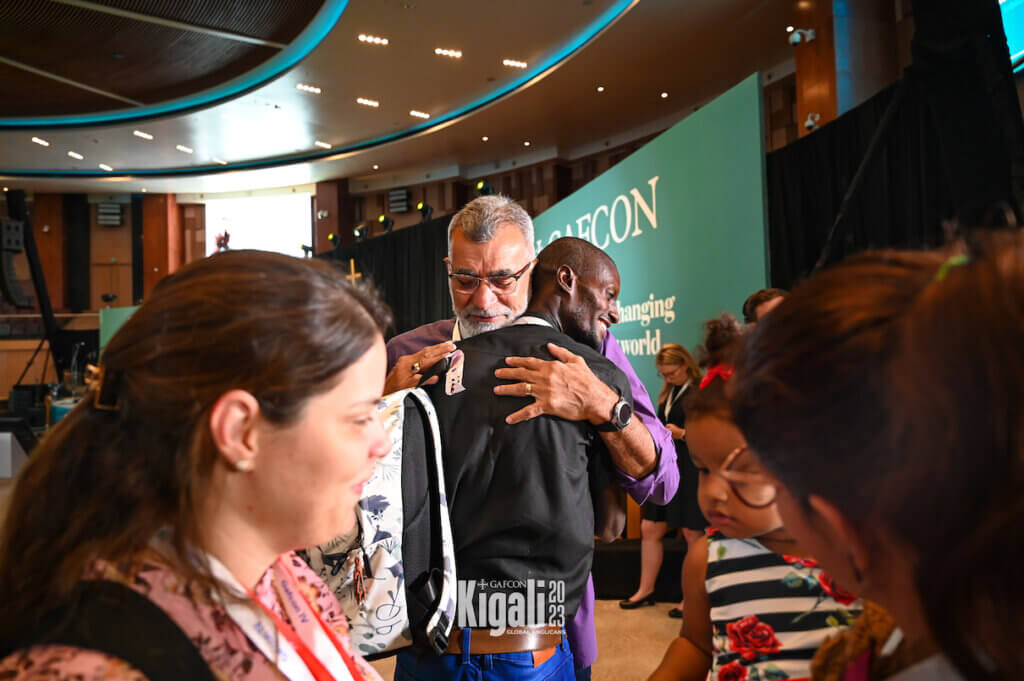Archbishop Kanishka Raffel of Sydney opened up the day with a morning teaching on Colossians Three. The foundation of the church’s identity is its union with Christ in all that he has done and will do. He spoke on the importance of embracing Christ’s supremacy and his identity as the Church, so that we can let go of the things in this world that define us. We can now know that there are no boundaries for those who want all that Christ has to give. And what he has to give is freedom from the old world of sin and death and union with himself. This hope is the basis for our identity as Christians. We must hold on to this hope despite the hidden aspects of that identity and that promise. We still see our own sin and selfishness, the persecution that the Church is going through, and the hardships that we suffer. But just as the glory of God was hiding in Christ on the cross, the glory of Christ is hidden in us as we walk through suffering. Our hope is that the glory of who we really are will one day be revealed.
The first plenary was led by the Rev. Dr. Ashley Null, who spoke on the renewal of the power to love, which is the heart of historic Anglicanism. He compared the English reformers’ view of the love of God as the central foundation for true repentance and transformation as opposed to the medieval view of self-condemnation and penance. Though the medieval church may have had the love of God as a theme in its spirituality, it had become obscured by many other teachings that brought man’s efforts to the forefront and God’s merciful love to the back.
Our sin, motivated by a desire to fill a void in our hearts that can only be filled by God’s love, is strengthened when robbed of the promise of God’s love. The devil convinces us that we’re unloved and that we should get our self-worth elsewhere, until we’re enslaved to the very things we’ve turned to. It is when we come to believe God’s love for us that we are given the inner strength to say “no” to the sins that took the place of his love. It is love that produces change; not fear, shame, or self-condemnation. Thomas Cranmer saw this major issue in the medieval church and put the love of God as the central theme for the English prayerbook and its liturgy. Out of this central theme, all other themes flow, so that God’s judgment is seen through the cross and the love of God, rather than the other way around. This is the great news that we have, not just for the world but for ourselves as we walk out our Christian life away from sin and towards God.
After lunch, attendees again broke out into seminars that reflected different ministries around the Anglican Communion. Today’s seminars included:
- Contending in the Cause of the Gospel, with Dr. Gloria Kwashi
- The Unchanging Gospel in a Changing World
- Your Sisters and Brothers Throughout the World
- Youth and Children
- Biblical Ministry in African Cultural Settings
- So Everyone Can See Your Progress, on selecting leaders, lifelong training, and developing and strengthening in ministry
Attendees were given free time before dinner, afterwhich they were able to attend a third night of God at Work in the World. This time, the focus was on Central and South America. Bishop Bill Atwood, Bishop of the ACNA International Diocese, hosted the speakers, who included Archbishop Tito Zavala of Chile, Bishop Eric Menees of the ACNA diocese of San Joaquin, Jenny Noyes of New Wineskins, and others. They spoke on the work of God in Mexico, Central America, and South America through the ministries of Caminamos Juntos and other ministries bringing outreach to Spanish and Portuguese speaking countries. Archbishop Ben Kwashi then went on stage to interview the Rev. Craig Roberts, head of Youth Works, from the Diocese of Sydney on the ministry going on with youth in Australia and the ways in which Gafcon can help develop missions for the sake of the next generation.


